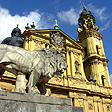AUGSBURG CATHEDRAL OF VIRGIN MARY
Holbein, Frescoes and Stained Glass
 Hard to miss in Augsburg, the High Cathedral of the Virgin Mary (Dom Mariä Heimsuchung) is the primary Roman Catholic Church in Augsburg, Bavaria. It was first built in the 11th century in Romanesque style, but enlarged in the 14th century with Gothic style additions and dedicated to the Visitation of Virgin Mary. Over of the centuries, the cathedral has been rebuilt many times, with the last significant renovation in 1863, when it was rebuilt in its present neo-Gothic style.
Hard to miss in Augsburg, the High Cathedral of the Virgin Mary (Dom Mariä Heimsuchung) is the primary Roman Catholic Church in Augsburg, Bavaria. It was first built in the 11th century in Romanesque style, but enlarged in the 14th century with Gothic style additions and dedicated to the Visitation of Virgin Mary. Over of the centuries, the cathedral has been rebuilt many times, with the last significant renovation in 1863, when it was rebuilt in its present neo-Gothic style.
 The cathedral was built over the site of buildings dating back to the 4th Century, located within the walls of the Roman era city, Augusta Vindelicorum, named for the Roman Emperor Caesar Augustus, whose statue isn’t far away in the main city square. The first known Christian church at the site was documented in the 8th Century and on the plaza in front of the cathedral the exposed excavated remains of part of the Roman wall and foundation of the earlier St. John’s Church from the 10th Century can be seen with archaeological finds on display of Roman Augsburg.
The cathedral was built over the site of buildings dating back to the 4th Century, located within the walls of the Roman era city, Augusta Vindelicorum, named for the Roman Emperor Caesar Augustus, whose statue isn’t far away in the main city square. The first known Christian church at the site was documented in the 8th Century and on the plaza in front of the cathedral the exposed excavated remains of part of the Roman wall and foundation of the earlier St. John’s Church from the 10th Century can be seen with archaeological finds on display of Roman Augsburg.
 The Romanesque portion of the structure was begun in 1043 by the Bishop Henry III, and completed in 1065. The two high towers, which can be seen from nearly anywhere in the city, were completed in 1075. A number of Gothic architectural forms were added over a hundred years from 1331 to 1431, most notably the eastern choir, which extends the building where it bulges into the Hoher Weg street. Unusual for Cathedrals, St Mary’s in Augsburg has two choirs, one at each end of the building, rather than replacing the older one in in the medieval reconstruction, the addition just expanded the structure to the east.
The Romanesque portion of the structure was begun in 1043 by the Bishop Henry III, and completed in 1065. The two high towers, which can be seen from nearly anywhere in the city, were completed in 1075. A number of Gothic architectural forms were added over a hundred years from 1331 to 1431, most notably the eastern choir, which extends the building where it bulges into the Hoher Weg street. Unusual for Cathedrals, St Mary’s in Augsburg has two choirs, one at each end of the building, rather than replacing the older one in in the medieval reconstruction, the addition just expanded the structure to the east.
 When the Protestant Reformation came in Germany where Augsburg played a central role (see Martin Luther Stairs), many of the church’s religious artworks were removed in the reformer zeal for a purer form of worship. The interior of the cathedral was reformed in the Baroque style during the 17th century, but then partially restored again to its Gothic appearance in the Neo-Gothic revival enthusiasm of the 19th century, with some of the artworks recovered.
When the Protestant Reformation came in Germany where Augsburg played a central role (see Martin Luther Stairs), many of the church’s religious artworks were removed in the reformer zeal for a purer form of worship. The interior of the cathedral was reformed in the Baroque style during the 17th century, but then partially restored again to its Gothic appearance in the Neo-Gothic revival enthusiasm of the 19th century, with some of the artworks recovered.
 Inside at the western end, the oldest part of the church on the western transept is a heroic scale fresco of St. Christopher dating from 1491 and other period painted walls. The crypt under the west choir was built in in the 10th century during the reign of the Bishop Ulrich. Be sure to turn around when exploring the crypt or you might miss some of the earliest medieval frescoes in the painted vaults, including an intimate close-up look into the face of Jesus.
Inside at the western end, the oldest part of the church on the western transept is a heroic scale fresco of St. Christopher dating from 1491 and other period painted walls. The crypt under the west choir was built in in the 10th century during the reign of the Bishop Ulrich. Be sure to turn around when exploring the crypt or you might miss some of the earliest medieval frescoes in the painted vaults, including an intimate close-up look into the face of Jesus.
 In the high rising nave are some of the later art treasures which remain. On the side aisles facing on the structural columns are four early Renaissance panels painted by Hans Holbein the Elder, depicting scenes of the life of Mary, painted in 1493. The northern transept has a series of portraits of the progression of bishops of Augsburg, begun in 1488, up to the present. High in the upper nave, unfortunately a little hard see in detail from the floor, are some of the oldest surviving stained glass windows in Germany, originating from the 12th Century. The Chapel of Our Lady was added in 1720, designed by Italian artist Gabriel de Gabrieli.
In the high rising nave are some of the later art treasures which remain. On the side aisles facing on the structural columns are four early Renaissance panels painted by Hans Holbein the Elder, depicting scenes of the life of Mary, painted in 1493. The northern transept has a series of portraits of the progression of bishops of Augsburg, begun in 1488, up to the present. High in the upper nave, unfortunately a little hard see in detail from the floor, are some of the oldest surviving stained glass windows in Germany, originating from the 12th Century. The Chapel of Our Lady was added in 1720, designed by Italian artist Gabriel de Gabrieli.
Diocesan Museum
The Diocesan Museum next to the Cathedral holds an exhibit of the recover art treasures of the church, including the original bronze doors from the 11th Century church and funeral artifacts of Emperor Charles V. © Bargain Travel Europe
Best vacation deals compare prices in Bavaria at TripAdvisor
Web
Info:
Augsburg
These articles are copyrighted and the sole property of Bargain Travel Europe and WLPV, LLC. and may not be copied or reprinted without permission.
See Also:
MOZARTHAUS - LEOPOLD MOZART AUGSBURG
AUGSBURG TOWN HALL RENAISSANCE RESTORATION
ST MARTIN’S ABBEY BASILICA WEINGARTEN

